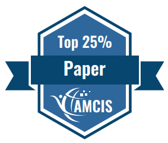Loading...
Paper Type
Complete
Paper Number
1106
Description
This paper deals with the investigation of the preferred appearance of embodied conversational agents (ECA) in the context of knowledge management. ECAs are artificial intelligence-based systems that are used in different contexts and support scenarios to assist human users and jointly work with them. An important aspect is the design and especially the appearance, which influences acceptance, interaction quality, and overall work performance. An online survey was used to determine preferred appearances of ECAs that are specifically used in the context of knowledge management. With a total of 104 participants, the results yielded findings for the appearance, kinetics, proxemics, and communication of ECAs in knowledge management. Participants expressed their preferences towards a realistic and human appearance, which speaks for a desire for human-like artificial intelligence. The results contribute to the practical design of ECAs as well as to existing theories on human-AI interaction, such as anthropomorphisms.
Recommended Citation
Siemon, Dominik and Jusmann, Sergej, "Preferred Appearance of Embodied Conversational Agents in Knowledge Management" (2021). AMCIS 2021 Proceedings. 1.
https://aisel.aisnet.org/amcis2021/adopt_diffusion/adopt_diffusion/1
Preferred Appearance of Embodied Conversational Agents in Knowledge Management
This paper deals with the investigation of the preferred appearance of embodied conversational agents (ECA) in the context of knowledge management. ECAs are artificial intelligence-based systems that are used in different contexts and support scenarios to assist human users and jointly work with them. An important aspect is the design and especially the appearance, which influences acceptance, interaction quality, and overall work performance. An online survey was used to determine preferred appearances of ECAs that are specifically used in the context of knowledge management. With a total of 104 participants, the results yielded findings for the appearance, kinetics, proxemics, and communication of ECAs in knowledge management. Participants expressed their preferences towards a realistic and human appearance, which speaks for a desire for human-like artificial intelligence. The results contribute to the practical design of ECAs as well as to existing theories on human-AI interaction, such as anthropomorphisms.
When commenting on articles, please be friendly, welcoming, respectful and abide by the AIS eLibrary Discussion Thread Code of Conduct posted here.



